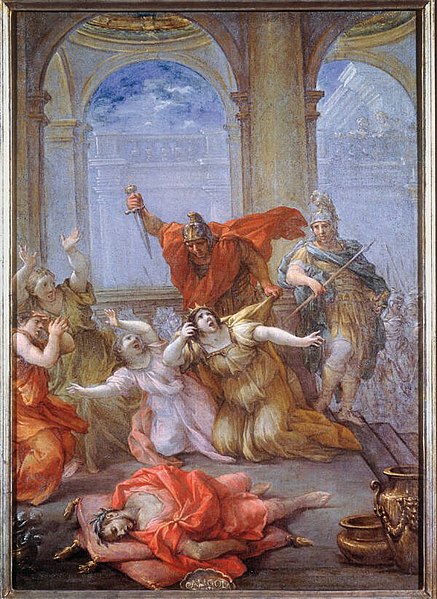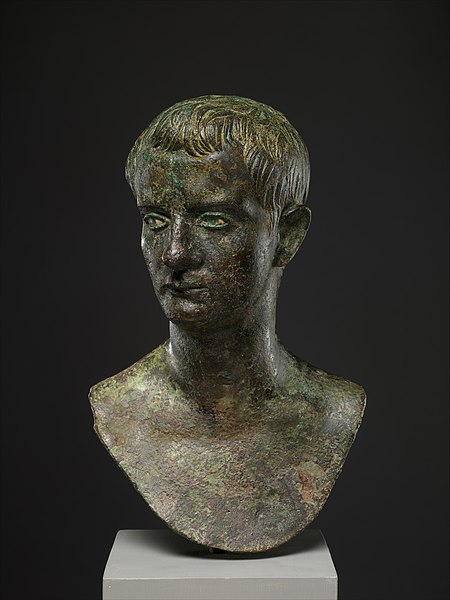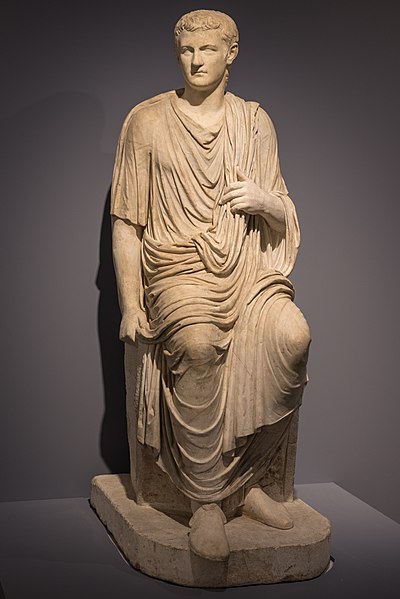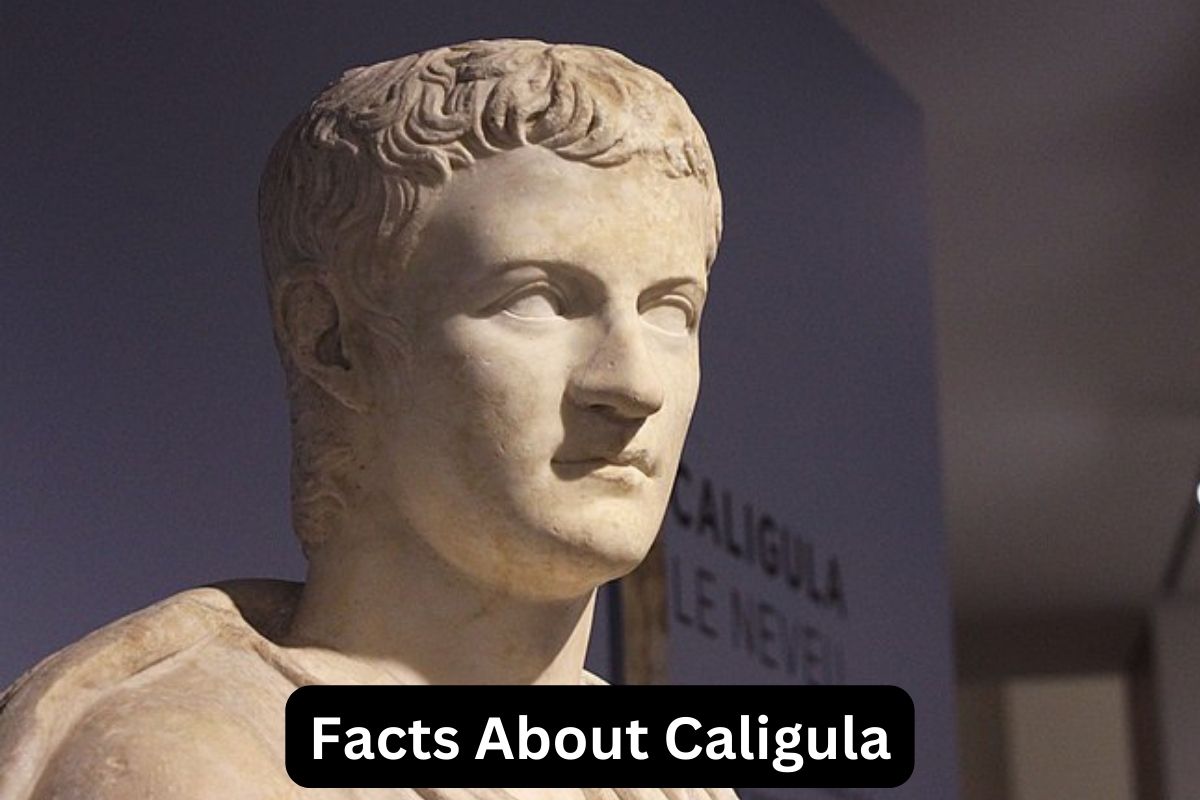Caligula was a Roman Emperor who ruled from 37 to 41 AD. He was born on August 31, 12 AD in Antium, Italy, and was the third emperor of the Julio-Claudian dynasty, succeeding Tiberius.
Although Caligula initially promised to restore political freedom and end Tiberius’ oppressive regime, his reign was marked by extravagance and cruelty.
He became infamous for his erratic behavior, bizarre actions, and sexual escapades, and was ultimately assassinated by members of the Praetorian Guard.
Despite his brief and controversial reign, Caligula remains a fascinating figure in Roman history, with historians debating whether his behavior was a result of mental illness or if he was simply a cruel and power-hungry ruler.
Caligula Facts
1. Caligula ruled from 37 to 41 AD
Caligula was a Roman Emperor who ruled from 37 to 41 AD: Caligula’s reign as emperor was short-lived, lasting only four years.
He became emperor after the death of Tiberius, his predecessor. Despite his brief reign, Caligula remains one of the most infamous and notorious figures in Roman history.
2. Real name Gaius Julius Caesar Augustus Germanicus Caligula
His real name was Gaius Julius Caesar Augustus Germanicus, but he was nicknamed “Caligula” which means “little boot” in Latin, because as a child, he would often wear miniature military boots: Caligula was the son of Germanicus and Agrippina the Elder.

His father was a highly regarded general and his mother was a granddaughter of Emperor Augustus. As a child, Caligula accompanied his father on military campaigns, wearing miniature military boots as a sign of his status.
3. Caligula was born on August 31, 12 AD
Caligula was born on August 31, 12 AD in Antium, Italy: Antium, located about 56 km south of Rome, was a popular vacation spot for Roman nobility. Caligula was born there while his parents were on holiday.
4. He was the third emperor of the Julio-Claudian dynasty
He was the third emperor of the Julio-Claudian dynasty, succeeding Tiberius: The Julio-Claudian dynasty was the first imperial dynasty of Rome, and included Emperor Augustus, Emperor Tiberius, Emperor Caligula, Emperor Claudius, and Emperor Nero.
Also Read: Nero Facts
Caligula succeeded Tiberius, who had ruled Rome for over two decades.
5. Caligula’s reign is known for its extravagance and cruelty

Caligula’s reign is known for its extravagance and cruelty, as he often engaged in lavish spending and brutal acts of violence against his own citizens.
Caligula’s reign was marked by his erratic and cruel behavior. He spent exorbitant amounts of money on public works, such as aqueducts, temples, and theaters, and held lavish banquets and festivals.
Also Read: Caligula Accomplishments
However, he also engaged in brutal acts of violence, such as ordering the execution of political opponents and engaging in sexual violence. His reign was marked by instability and fear, as he ruled through terror and intimidation.
6. He was initially popular with the Roman people
He was initially popular with the people, as he promised to restore political freedom and end Tiberius’ oppressive regime: After Tiberius’ long and unpopular reign, Caligula’s promises of political freedom and an end to corruption were well received by the Roman people.
He also gave large bonuses to the military and pardoned prisoners, which further endeared him to the population.
7. Caligula became infamous for his erratic behavior and bizarre actions
However, Caligula soon became infamous for his erratic behavior and bizarre actions, such as declaring himself a god and ordering his horse to be made a consul: Caligula’s behavior became increasingly erratic and unstable, causing widespread fear and anxiety among his subjects.

He declared himself a god and demanded that he be worshiped as such, which was considered blasphemous and offensive to Roman religion. He also appointed his horse, Incitatus, as a consul, which was seen as a mockery of Roman political institutions.
8. Caligula was also known for his sexual escapades
Caligula was also known for his sexual escapades and was accused of incest with his sisters: Caligula’s sexual behavior was notorious and scandalous, even by Roman standards.
He had numerous affairs with both men and women, and was accused of engaging in incestuous relationships with his sisters, Drusilla and Livilla.
9. He was a prolific builder
He was a prolific builder, constructing public works such as aqueducts, temples, and theaters: Despite his extravagant spending on personal pleasures, Caligula was also a prolific builder.
He constructed numerous public works, including aqueducts to supply Rome with water, temples to honor the gods, and theaters for public entertainment.
10. Caligula was assassinated by members of the Praetorian Guard
Caligula was assassinated by members of the Praetorian Guard on January 24, 41 AD: Caligula’s reign came to an abrupt end when he was assassinated by members of the Praetorian Guard, the elite soldiers who served as the emperor’s personal bodyguards.
The exact reasons for the assassination are unclear, but it is believed that Caligula’s increasingly erratic behavior and cruelty had alienated many of his supporters and made him a target for assassination. After his death, the Praetorian Guard proclaimed Caligula’s uncle, Claudius, as the new emperor.
11. After his death, the Senate attempted to erase his memory from history
After his death, the Senate attempted to erase his memory from history by destroying his statues and coins: Following Caligula’s assassination, the Roman Senate attempted to erase his memory from history by destroying his statues and coins, and even striking his name from official records.
This was a common practice for unpopular emperors, as the Senate sought to distance itself from their unpopular reigns.
12. Caligula’s reputation as a mad emperor was cemented in popular culture
Caligula’s reputation as a mad emperor was cemented in popular culture, with films and literature often depicting him as a ruthless tyrant.
Caligula’s reputation as a mad and cruel emperor has been cemented in popular culture, with numerous films, plays, and literature depicting him as a ruthless tyrant. This includes the infamous 1979 film “Caligula,” which featured graphic scenes of violence, sex, and debauchery.
13. Historians have debated if Caligula’s behavior was a result of mental illness
Historians have debated whether Caligula’s behavior was a result of mental illness or if he was simply a cruel and power-hungry ruler: Historians continue to debate the exact reasons for Caligula’s erratic behavior and cruelty.
Some have suggested that he suffered from a mental illness, such as epilepsy or bipolar disorder, while others argue that he was simply a cruel and power-hungry ruler who enjoyed inflicting pain on his subjects.
14. Some of the more outrageous stories about Caligula’s behavior
Some of the more outrageous stories about Caligula’s behavior, such as his order to collect seashells from the ocean, are likely exaggerations or fabrications.
Many of the more outrageous stories about Caligula’s behavior are likely exaggerations or fabrications, as they were often told by his enemies or those seeking to sensationalize his reign.
While it is true that Caligula engaged in many bizarre and cruel acts, some of the stories about him, such as his order to collect seashells from the ocean, are likely to be exaggerated or false.
15. Caligula left a lasting impact on Roman history
Despite his brief and controversial reign, Caligula left a lasting impact on Roman history and remains a fascinating figure for historians and the general public alike: Despite his reign being one of the most infamous in Roman history, Caligula left a lasting impact on the Roman Empire.
His extravagance and building programs helped to stimulate the economy and left many lasting monuments. Additionally, his reign helped to shape the political and cultural landscape of Rome in the years that followed. Despite his many faults, Caligula remains a fascinating figure for historians and the general public alike, as his life and reign continue to generate interest and debate.
